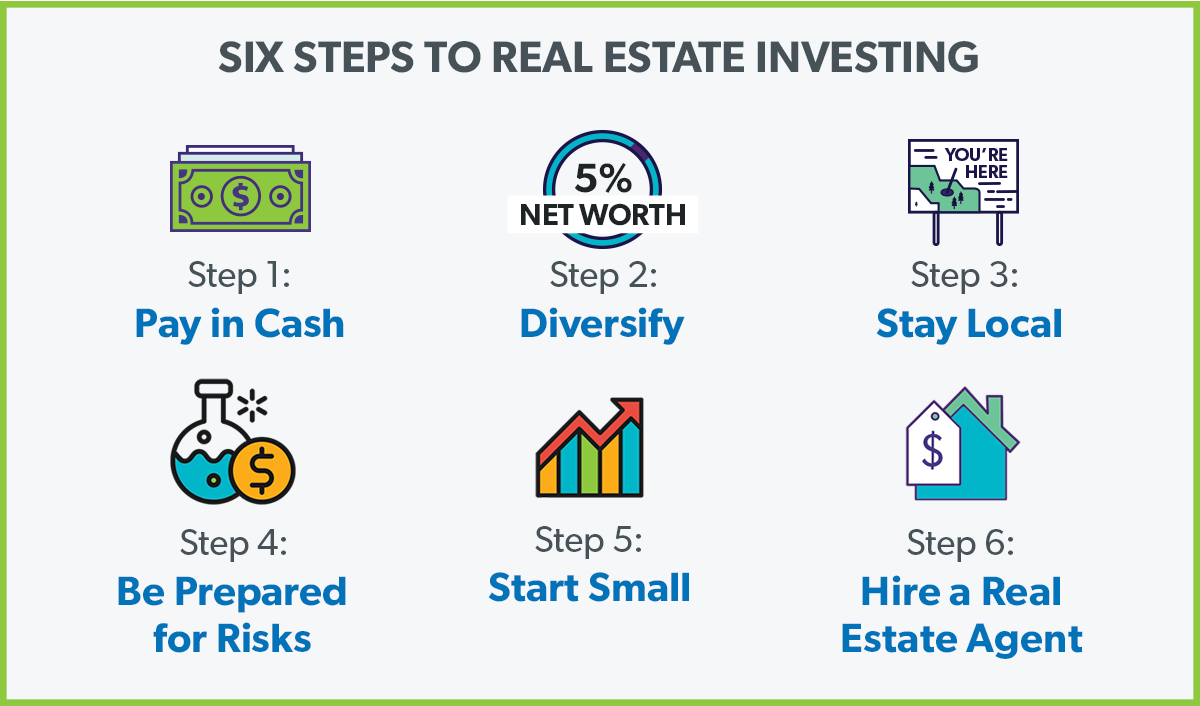REAL ESTATE INVESTMENT
Investment
Back to Homepage
INVESTING & RETIREMENT
How to Invest in Real Estate
If you’re interested in building wealth, you’ve probably wondered about real estate investing. On the one hand, it seems like a great idea, especially if you live in an area with a booming real estate market. But on the other hand, you may not be ready for the commitment.
As recent as last year, only 15% of Americans were investing in property outside their primary residence, according to a RealtyShares survey. However, while real estate investing is not exactly widespread, most Americans think it’s a good investment.(1)
What holds people back? The costs and skills needed to get started. Only 38% of those surveyed thought they’d actually be able to flip a house start to finish, and more than 80% of millennials wished that real estate investing was easier.(2)
Let’s be honest. Investing in real estate is a big commitment, and it’s important to really understand it before you dive in. I never want you to invest in something you don’t understand—especially real estate. What are the different types of real estate investing? Is it really worth all the effort it takes? Is this type of investing reliable enough to be part of your retirement plan?
Whether or not real estate investing is a smart idea totally depends on you, your financial situation, and your goals for the future. It’s not for everyone, but it can be a great wealth-building tool when it’s done the right way!
Types of Real Estate Investing
Think investing is limited to owning a property and renting it out? Think again. There are actually several different types of real estate investing, and some of them don’t involve renters at all.
Here are the most common ways people invest in real estate and why I do or don’t recommend them.
Home Ownership
Rental Properties
Owning a property that you rent out is another form of real estate investing.
The benefit to this is that the rental income becomes an additional revenue stream, which can be used for retirement. It could easily add thousands of dollars to your yearly income. Then, if you sell the property, you could also earn a nice profit if it has increased in value. You could rent out anything from a bedroom to a whole house to a commercial property like an apartment building.
I know this sounds great, but listen up: Renting out a property brings its challenges. While you’d think rental income would be consistent month in and month out, there could be seasons someone doesn’t pay rent or you find yourself in between renters. You also have to consider the additional expenses of maintenance, repairs and insurance.
House Flipping
In 2017 alone, over 200,000 single-family homes and condos were flipped!(3)Flipping a house means you purchase it, make updates and improvements, and then sell it—all within a fairly quick amount of time.
When flipping a house, remember that the key is to buy low. In most cases, you can’t expect to make a decent profit unless you’re really getting a great deal on the front end.
House flipping is appealing because it’s a quicker process than renting a property for years. In just months, you could get the house back on the market and (hopefully) turn a nice profit. But just like other investments, there’s a risk you won’t make money on it. You could even lose money.
The downside of house flipping is that updates and renovations have the potential to cost more than you plan, and those costs could eat into your profits. It takes a lot of time and effort, so you need to think about whether or not you want to devote that kind of energy to such a project. And before you jump into house flipping, talk to a real estate agent about the potential in your local market.
REITs
Real estate investment trusts (REITs) are a less conventional way to invest in real estate. What’s an REIT? REITs are companies or trusts that own or finance real estate investments, and they sell shares to investors who hope to receive a percentage of the income made off that real estate investment.
I don’t recommend investing in REITs, and here’s why: When you invest in an REIT, you don’t have any control in the decisions made about the property. If you want to get into real estate investing, do it the conventional way and purchase your own property.
If that kind of hands-on investing isn’t for you, that’s okay. Stick with investing in mutual funds, which have been around much longer than REITs. Talk to your financial advisor and choose mutual funds with a long history of above-average returns instead of putting your money in REITs.
How to Make Money Investing in Real Estate
There are two main ways that investors make money from their real estate properties: appreciated value of the property over time and cash flow from rental income.
Appreciated Value
Despite the ups and downs of the real estate market, most properties increase in value over the long term.(4)
The trick to being able to make a profit is buying a house at a low price and riding out any downturns in the market until it’s a better time to sell. That’s why it’s so important to purchase any investing properties with cash and keep money set aside for repairs.
To make money off a house that’s increased in value, you have to sell the property, which can take time. That’s why it’s important to have three to six months of expenses saved in an emergency fund in addition to the money you set aside for upkeep and repairs. If the unexpected happens, you’ve got cash to cover it without dipping into your other investments.
When you pay cash and have an emergency fund, you lessen the risk of being forced to sell a property at a loss. Instead, you can hang onto the property until it’s a good time to sell.
Rental Income
Generating income from rentals is the top reason why investors purchase a property.(5) Once you’ve secured renters, owning and renting out property is a great way to make additional income with a minimal amount of effort.
Other than needing cash on hand to cover any repairs or maintenance, your part is pretty hands-off. There’s even less for you to do if you hire a property management company—though that will cut into your profits. Regardless, you make money simply from being the owner of the property.
Keep in mind, though, that dealing with renters can be frustrating and time-consuming. It can also be costly if the renters damage the building or unit of property. You may even have to hire a lawyer if you need to evict a tenant.
What Are the Tax Implications of Real Estate Investing?
Taxes can get complicated, especially when you have multiple income streams and are investing outside a workplace retirement account. That’s why my first piece of advice is to talk to a tax pro. They will be able to help you understand the impact of your investing decisions and keep you up-to-date on tax code changes.
In the meantime, here are the most common tax implications you could encounter when it comes to investing in real estate.
Capital Gains Tax
When you sell an investment property after owning it for at least a year, you’ll pay capital gains tax on the profit. Let’s say you buy a property for $100,000. Years later you sell the property for $160,000. That’s a gross profit of $60,000.
Since this is an investment property, you’re allowed to deduct the $9,600 you paid in real estate commission fees (6% of the price the property sold for), which brings your capital gains to $50,400.
How is that $50,400 taxed? It depends on your tax bracket for your ordinary income. If you are in the 10% or 12% tax bracket in 2018, you’ll pay 0%. If you’re in the 22%, 24%, 32% or 35% tax bracket, you’ll pay 15% of your net profit in capital gains. If your income falls in the 35% or 37% tax bracket, you’ll pay 20% capital gains tax.(6)
Let’s say you’re in the 22% tax bracket, so you pay 15% capital gains. In this example, 15% of $50,400 means you’d pay $7,560 in taxes.
Short-Term Capital Gains Tax
What about a short-term investment like a house flip? When you have owned the property for less than a year, your profits are taxed according to short-term capital gains.
What’s the difference between long-term capital gains and short-term capital gains when it comes to taxes? Long-term capital gains uses your tax bracket as a reference to determine the percentage of taxes you owe on those gains. Short-term capital gains tax is even simpler. The profit you make from a short-term investment is counted as part of your annual income.(7)
Let’s say your annual income is $50,000, and you made a $20,000 profit on a house flip this year. Your taxable income is $70,000, which puts you in the 22% tax rate.
Taxation on Rental Income
Any money you make from rental income must be declared as income on your tax return. However, when you own property, you can also claim deductible expenses, such as repairs and maintenance—but be mindful that improvements won’t count. Maybe you made $10,000 this year from rental income, but you also completed $1,500 worth of repairs on the property. You can deduct the $1,500, making your taxable rental income $8,500.(8)
Paying the tax bill on investments can be confusing. Make sure you’re meeting regularly with your tax pro to go over your financial information. You don’t want to get slapped with a penalty.
How to Start Investing in Real Estate in Six Steps
When you’re ready to start buying investment property, here are the guidelines to follow.

Step 1: Pay in cash. When you pay for an investment property with cash, you save thousands of dollars in interest. Plus, you won’t ever have to worry about foreclosure. Creating unnecessary risk by financing an investment is just a bad idea. And one of the best perks of paying cash? You actually get to keep the money you make from rent payments!
Step 2: Diversify. As a rule of thumb, I recommend having only 5% of your net worth tied up in real estate investments. If your whole net worth is invested in real estate, any fluctuation in the market could make you panic. It’s important to keep your nest egg diversified to minimize risk. Mutual funds invested through your 401(k), Roth IRA and other retirement savings accounts should be the foundation of your wealth-building strategy.
Step 3: Stay local. If you want to rent out properties, don’t buy a house in Arizona if you live in Illinois. Not only will you need to hire a property management company, but you will also have a difficult time assessing any damages or requests for repairs. As the owner, you will care about the condition of the house more than anyone else. While you may decide to hire a property management company—which is fine if you do—it’s important to live close enough to check out the property for yourself every so often.
Step 4: Be prepared for risks. In most cases, renting out property is not as simple as getting renters and checking in once a year. Sometimes months will go by in between renters, which can be a tough blow if you’re not financially prepared. And even in the best renting situations, appliances will still break and gutters will still need to be replaced. You should be prepared to spend money for upkeep and repairs.
Step 5: Start small. If you’re not sure if owning a rental property is for you, test it out. Maybe you have a space above your garage or an extra bedroom you could rent out. That experience can give you a taste of what it’s like to own a rental. It’s also a good idea to talk to other real estate investors. What do they wish they would have known before getting started?
Step 6: Hire a real estate agent. You don’t need to buy real estate on your own. Even in the beginning stages of weighing the pros and cons of real estate investing, it’s crucial to talk to a real estate agent in your local market. They will know what areas you should look into and what potential hurdles you may face as a real estate investor. And then when it comes time to purchase a property, you’ll need their expertise to make sure you’re getting a great deal.
When Should You Start Investing in Real Estate?
You may be wondering where investing in real estate fits into Dave’s Baby Steps or your overall wealth-building plan. That’s a great question.
You should invest in real estate only after you’ve already paid off your own home (Baby Step 6). That means you’re completely debt-free with an emergency fund of three to six months of expenses saved. You should also already be investing at least 15% of your income into retirement accounts, like a workplace 401(k) or Roth IRA.
I get it. Waiting until you’ve paid off your house probably sounds like a really long time, especially if you feel like the opportunity to invest in real estate is knocking at your door right now. But trust me on this. It’s worth it to wait until you’re really ready.
Let’s take Greg as an example. He owes $150,000 on his own house and makes $5,000 per month. Greg’s kept his mortgage payment to 25% of his monthly take-home pay, paying $1,250 a month. He thinks having rental income will help him make progress on his financial goals, so he decides to finance a rental property and take out a 15-year fixed-rate mortgage for $100,000. That adds a second mortgage payment of $927 to his monthly budget, but he plans to rent out the house for $1,350 per month. Greg thinks it’s a great plan.
What Greg didn’t know is that it would take three months to find renters, which means he paid $2,781 in mortgage payments on his new rental while it sat empty. For those three months, paying the mortgage on his own place and his rental took up 44% of his income! He felt like he could barely breathe.
What would he do if the air-conditioning unit went out or the dishwasher randomly started leaking? What if Greg lost his job? Financing a rental or purchasing one while you still have a balance on your own home mortgage can turn into a financial disaster.
Don’t rush it. Real estate can be a fantastic investment—but not if you do it the wrong way. So be smart and wait for the right time.
Is Real Estate Investing for You?
Contact us today for free consultation +1 (714) 855. 9292





